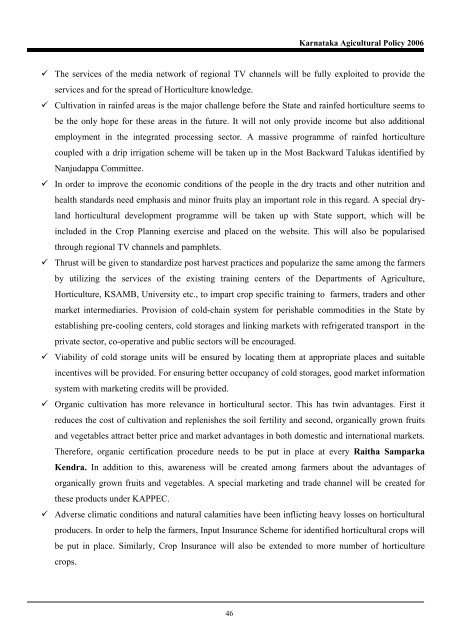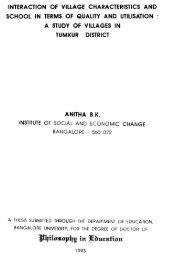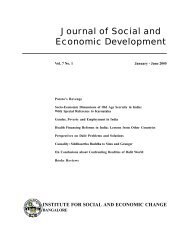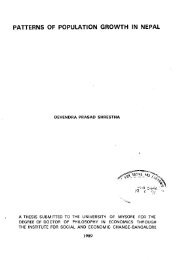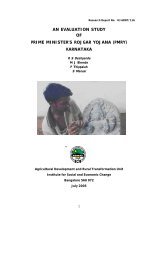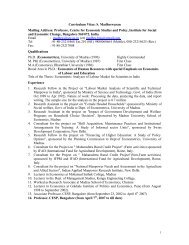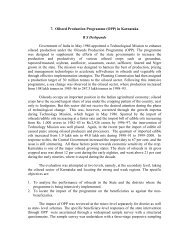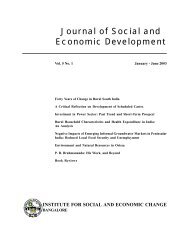Karnataka Agricultural Policy - Institute for Social and Economic ...
Karnataka Agricultural Policy - Institute for Social and Economic ...
Karnataka Agricultural Policy - Institute for Social and Economic ...
You also want an ePaper? Increase the reach of your titles
YUMPU automatically turns print PDFs into web optimized ePapers that Google loves.
<strong>Karnataka</strong> Agicultural <strong>Policy</strong> 2006<br />
The services of the media network of regional TV channels will be fully exploited to provide the<br />
services <strong>and</strong> <strong>for</strong> the spread of Horticulture knowledge.<br />
Cultivation in rainfed areas is the major challenge be<strong>for</strong>e the State <strong>and</strong> rainfed horticulture seems to<br />
be the only hope <strong>for</strong> these areas in the future. It will not only provide income but also additional<br />
employment in the integrated processing sector. A massive programme of rainfed horticulture<br />
coupled with a drip irrigation scheme will be taken up in the Most Backward Talukas identified by<br />
Nanjudappa Committee.<br />
In order to improve the economic conditions of the people in the dry tracts <strong>and</strong> other nutrition <strong>and</strong><br />
health st<strong>and</strong>ards need emphasis <strong>and</strong> minor fruits play an important role in this regard. A special dryl<strong>and</strong><br />
horticultural development programme will be taken up with State support, which will be<br />
included in the Crop Planning exercise <strong>and</strong> placed on the website. This will also be popularised<br />
through regional TV channels <strong>and</strong> pamphlets.<br />
Thrust will be given to st<strong>and</strong>ardize post harvest practices <strong>and</strong> popularize the same among the farmers<br />
by utilizing the services of the existing training centers of the Departments of Agriculture,<br />
Horticulture, KSAMB, University etc., to impart crop specific training to farmers, traders <strong>and</strong> other<br />
market intermediaries. Provision of cold-chain system <strong>for</strong> perishable commodities in the State by<br />
establishing pre-cooling centers, cold storages <strong>and</strong> linking markets with refrigerated transport in the<br />
private sector, co-operative <strong>and</strong> public sectors will be encouraged.<br />
Viability of cold storage units will be ensured by locating them at appropriate places <strong>and</strong> suitable<br />
incentives will be provided. For ensuring better occupancy of cold storages, good market in<strong>for</strong>mation<br />
system with marketing credits will be provided.<br />
Organic cultivation has more relevance in horticultural sector. This has twin advantages. First it<br />
reduces the cost of cultivation <strong>and</strong> replenishes the soil fertility <strong>and</strong> second, organically grown fruits<br />
<strong>and</strong> vegetables attract better price <strong>and</strong> market advantages in both domestic <strong>and</strong> international markets.<br />
There<strong>for</strong>e, organic certification procedure needs to be put in place at every Raitha Samparka<br />
Kendra. In addition to this, awareness will be created among farmers about the advantages of<br />
organically grown fruits <strong>and</strong> vegetables. A special marketing <strong>and</strong> trade channel will be created <strong>for</strong><br />
these products under KAPPEC.<br />
Adverse climatic conditions <strong>and</strong> natural calamities have been inflicting heavy losses on horticultural<br />
producers. In order to help the farmers, Input Insurance Scheme <strong>for</strong> identified horticultural crops will<br />
be put in place. Similarly, Crop Insurance will also be extended to more number of horticulture<br />
crops.<br />
46


